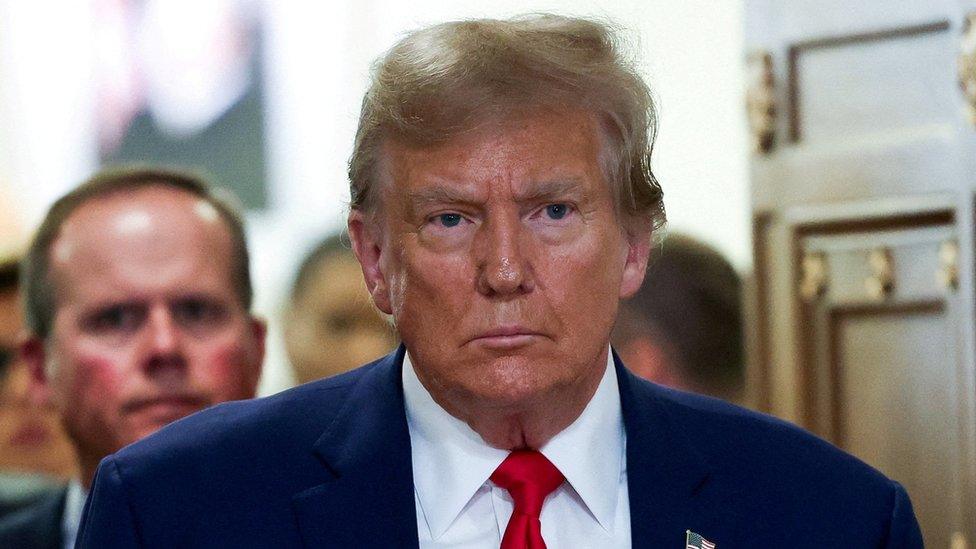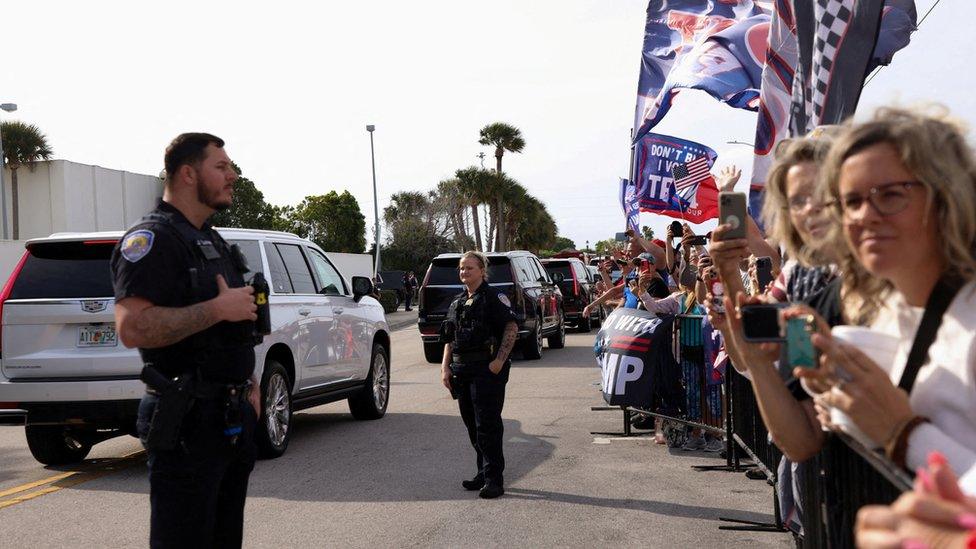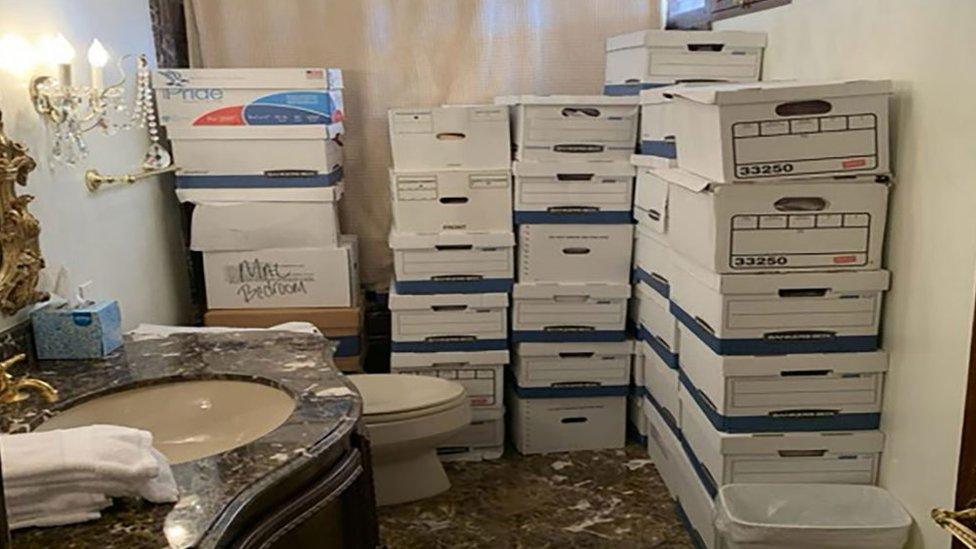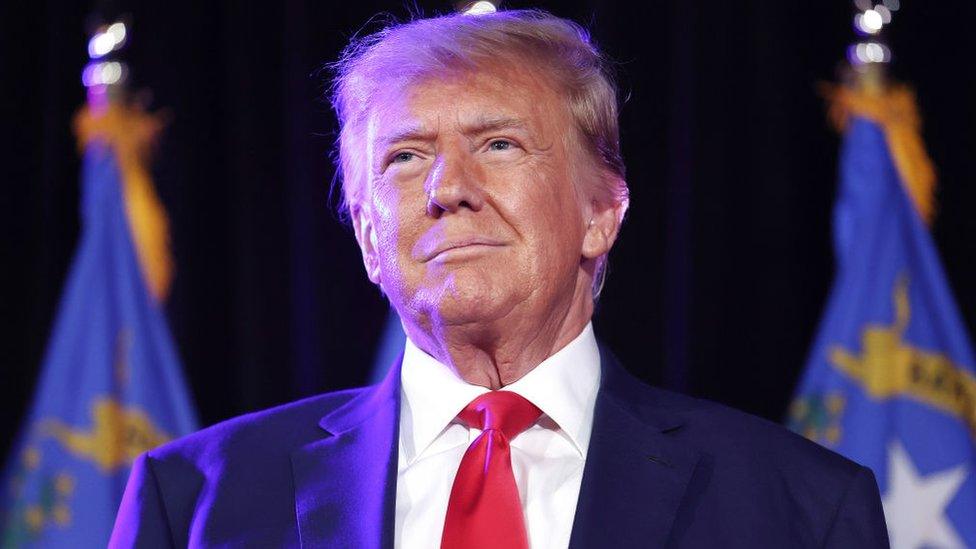Donald Trump returns to court as judge considers delay in classified documents trial
- Published

Donald Trump was in court in Florida on Friday, as a judge hinted she could delay his criminal trial for alleged mishandling of classified documents.
Originally scheduled to start in May, the trial has been held up by a legal battle over what evidence Mr Trump's legal team will be able to review.
Prosecutors are pushing for a 8 July start, while Mr Trump instead wants a date after the election, or in August.
But despite being widely expected, a trial date was not set on Friday.
Instead Judge Aileen Cannon, a Trump appointee, haggled with each side during the three-hour session over the pre-trial procedures and hearings that may be needed to get the case to trial.
"The one thing the parties can agree on is this case can be tried this summer," said Jay Bratt, the deputy to Special Counsel Jack Smith, who is leading the investigation.
Todd Blanche, an attorney representing the former president, argued that the "easy solution" was to begin in late November, after the 2024 election, to avoid "working ourselves into almost a frenzy".
His client, he added, was already slated to go on trial in New York from late March through mid-May and "cannot effectively prepare for this trial by July".
He was referring to Mr Trump's trial later this month - set for 25 March - related to allegations related to money he paid adult film actress Stormy Daniels. Mr Blanche is defending Mr Trump in that case too.
Judge Cannon said pre-trial deadlines proposed by the government were "unrealistic", suggesting she would build space in the timeline to "allow for flexibility".
Mr Trump, who sat silently with his lawyers, has pleaded not guilty to 40 felony charges in this case.
He is accused of retaining sensitive national security files at his Mar-a-Lago resort in Florida after leaving office in January 2021 and then obstructing repeated government efforts to get them back.
Indicted alongside him on related charges are his personal aide Walt Nauta and Mar-a-Lago property manager Carlos de Oliveira.
The ex-president is expected to unofficially clinch the Republican nomination for president later this month and has painted the four criminal cases he faces this year as a politically motivated "witch hunt" brought by Democrats to hurt his re-election prospects.
He has fought, with some success, to delay each case against him. If he returns to office, he will have the power to either end, weaken or further delay each effort to prosecute him.

People gathered outside court in Fort Pierce, Florida, as the motorcade of Mr Trump arrived
On Thursday, his lawyers in the Florida case said in a court filing: "As the leading candidate in the 2024 election, President Trump strongly asserts that a fair trial cannot be conducted this year in a manner consistent with the Constitution."
A trial that takes place before the election would interfere with Mr Trump's "Sixth Amendment right to be present and to participate in these proceedings" as well as the "First Amendment right that he shares with the American people to engage in campaign speech", they claimed.

Prosecutors say Mr Trump illegally held onto classified files at his Mar-a-Lago, Florida estate
Some legal experts have accused Judge Cannon of slow-walking the pre-trial process, including by postponing key deadlines.
She first hinted at a delay in the original schedule last November, citing a Trump team complaint about the time it would need to review what she called the "unusually high volume of unclassified and classified discovery" in the case.
That material includes 1.3 million pages of unclassified documents, 5,500 pages of classified documents and 60 terabytes of closed-circuit television footage, she said.
But Judge Cannon sided with prosecutors in two key rulings earlier this week regarding what evidence may be presented.
On Wednesday, she rejected Mr Trump's request to see more of the classified government filings than it already has access to. And the previous day she ruled that Mr Nauta and Mr de Oliveira did not require access to any of the classified discovery submitted by Special Counsel Jack Smith's team of prosecutors.
The judge's eventual decision on the trial start date will be key in shaping the timeline of Mr Trump's other court dates.
His trial in New York related to hush money payments to porn star Stormy Daniels begins on 25 March and is expected to last six weeks. His federal case in Washington on election interference charges, also brought by the special counsel's office, is on hold as the US Supreme Court rules on Mr Trump's claim that he should be immune from prosecution.
A trial in Georgia on similar charges awaits a court date and has been upended by an effort to remove the local district attorney leading the prosecution.
- Published21 July 2023
